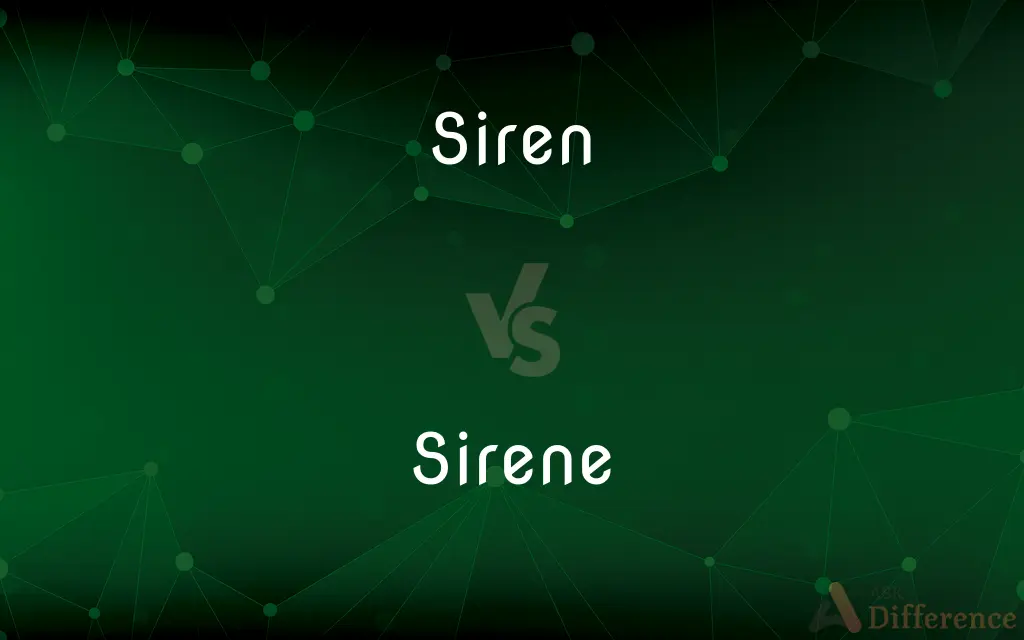Siren vs. Sirene — What's the Difference?
Edited by Tayyaba Rehman — By Fiza Rafique — Updated on April 7, 2024
Siren refers to a mythological creature or a device emitting loud warnings, while Sirene is often a variant spelling for siren or a cheese in Balkan cuisine.

Difference Between Siren and Sirene
Table of Contents
ADVERTISEMENT
Key Differences
Siren, in mythology, denotes a creature known for luring sailors with enchanting music, leading to peril. Sirene, on the other hand, while sometimes a variant spelling for "siren," is distinctively known in culinary contexts, specifically as a type of white brine cheese popular in the Balkans.
The siren has permeated various cultural narratives, symbolizing temptation or danger, often depicted as half-bird, half-woman in ancient lore. Conversely, Sirene is celebrated in culinary traditions, serving as a staple in dishes like Shopska salad, lending a tangy, rich flavor.
In modern usage, "siren" extends beyond mythology to describe audible warning devices used in emergency vehicles or alarms, signaling danger or attention. Sirene, however, remains firmly rooted in the culinary domain, prized for its texture and taste in salads, baked goods, and other dishes.
While sirens (mythological and mechanical) play roles in safety, caution, or storytelling, Sirene's role is primarily nutritional, contributing to the culinary heritage and enjoyment in the Balkans and beyond.
Both terms, despite their vastly different contexts—mythological and culinary—share a phonetic similarity, yet their implications and uses in society diverge significantly, illustrating the rich diversity of language and culture.
ADVERTISEMENT
Comparison Chart
Definition
Mythological creature or warning device.
A type of cheese or variant spelling for siren.
Origin
Greek mythology and modern technological development.
Balkan cuisine.
Role in Culture
Symbolizes danger or caution.
Integral part of culinary tradition.
Physical Description
Half-bird, half-woman (mythology) or mechanical device.
White brine cheese with a tangy flavor.
Usage
In stories, alarms, and emergency signaling.
Primarily in culinary dishes like salads and baked goods.
Compare with Definitions
Siren
A device emitting loud warnings.
The siren of the ambulance pierced through the night, signaling an emergency.
Sirene
A type of white brine cheese from the Balkans.
Sirene cheese is a key ingredient in traditional Shopska salad.
Siren
Used for alarms and emergency signals.
The sound of the fire siren sent everyone into immediate action.
Sirene
A staple in Balkan cuisine.
No breakfast in the region is complete without a piece of sirene.
Siren
Originally depicted as half-bird, half-woman.
Ancient sculptures often depict sirens with the body of a bird and the head of a woman.
Sirene
Known for its rich, tangy taste.
The creamy texture and tangy taste of sirene cheese make it beloved by many.
Siren
A mythological creature known for enchanting music leading sailors to peril.
The ancient mariners feared the siren's song, believing it spelled doom.
Sirene
Sometimes used to refer to the mythological siren.
The term sirene can be found in older texts as an alternate spelling for siren.
Siren
Represents temptation or danger.
In literature, a siren can symbolize the lure of forbidden knowledge.
Sirene
Prized for its tangy flavor in dishes.
Crumbled sirene cheese enhances the flavor of many Balkan dishes.
Siren
Greek Mythology One of a group of sea nymphs who by their sweet singing lured mariners to destruction on the rocks surrounding their island.
Sirene
Sirene (Albanian: djathë i bardhë; Bulgarian: сирене [ˈsirɛnɛ]; Macedonian: сирење; Serbian: сир/sir) also known as "white brine sirene" (Bulgarian: бяло саламурено сирене) is a type of brined cheese made in the Balkans (South-Eastern Europe), especially popular in Bulgaria, Serbia, Montenegro, Bosnia and Herzegovina, North Macedonia, Romania, Albania and also in Israel and Lebanon. It is made of the milk of goats, sheep, or cows, or a mixture of these.
Siren
Siren A woman regarded as irresistibly alluring.
Sirene
(uncommon) A slightly crumbly brine cheese made of cow, sheep, and/or goat milk, similar to feta; popular in the Balkan peninsula.
Siren
A device in which compressed air or steam is driven against a rotating perforated disk to create a loud, often wailing sound as a signal or warning.
Sirene
See Siren, 6.
Siren
An electronic device producing a similar sound as a signal or warning
A police car siren.
Siren
Any of several slender aquatic salamanders of the family Sirenidae of eastern North America, having external gills, small forelimbs, and no hind limbs.
Siren
(Greek mythology) One of a group of nymphs who lured mariners to their death on the rocks.
Siren
One who sings sweetly and charms.
Siren
A dangerously seductive woman.
Siren
(biology) A member of an order of mammals of Sirenia.
Siren
(biology) A member of a genus of aquatic salamanders of the family Sirenidae, commonly used for all species subsumed under the family of Sirenidae.
Siren
(entomology) Any of various nymphalid butterflies of the genus Hestina.
Siren
A device, either mechanical or electronic, that makes a piercingly loud sound as an alarm or signal, or the sound from such a device (first recorded 1879).
Siren
(music) A musical instrument, one of the few aerophones in the percussion section of the symphony orchestra (patented as Acme Siren in 1895).
Siren
An instrument for demonstrating the laws of beats and combination tones.
Siren
An astrophysical event that can be used for calculating cosmic distances.
Siren
To make a noise with, or as if with, a siren.
Siren
Relating to or like a siren.
Siren
One of three sea nymphs, - or, according to some writers, of two, - said to frequent an island near the coast of Italy, and to sing with such sweetness that they lured mariners to destruction.
Next where the sirens dwell you plow the seas;Their song is death, and makes destruction please.
Siren
An enticing, dangerous woman.
Siren
Something which is insidious or deceptive.
Consumption is a siren.
Siren
A mermaid.
Siren
Any long, slender amphibian of the genus Siren or family Sirenidæ, destitute of hind legs and pelvis, and having permanent external gills as well as lungs. They inhabit the swamps, lagoons, and ditches of the Southern United States. The more common species (Siren lacertina) is dull lead-gray in color, and becames two feet long.
Siren
An instrument for producing musical tones and for ascertaining the number of sound waves or vibrations per second which produce a note of a given pitch. The sounds are produced by a perforated rotating disk or disks. A form with two disks operated by steam or highly compressed air is used sounding an alarm to vessels in fog.
Siren
Of or pertaining to a siren; bewitching, like a siren; fascinating; alluring; as, a siren song.
Siren
A sea nymph (part woman and part bird) supposed to lure sailors to destruction on the rocks where the nymphs lived;
Odysseus ordered his crew to plug their ears so they would not hear the Siren's fatal song
Siren
A woman who is considered to be dangerously seductive
Siren
A warning signal that is a loud wailing sound
Siren
An acoustic device producing a loud often wailing sound as a signal or warning
Siren
Eel-like aquatic North American salamander with small forelimbs and no hind limbs; have permanent external gills
Common Curiosities
What dishes feature Sirene cheese?
Sirene cheese is featured in a variety of dishes, including Shopska salad, baked goods, and as a topping or filling in many Balkan recipes.
What is Sirene?
Sirene is primarily known as a type of white brine cheese popular in Balkan cuisine.
How do mythological sirens differ from modern sirens?
Mythological sirens are creatures from Greek mythology, while modern sirens are mechanical devices used for emergency alerts.
How is Sirene cheese made?
Sirene cheese is made from sheep, goat, or cow milk and is soaked in a brine solution, giving it a tangy flavor and crumbly texture.
Are sirens considered dangerous in mythology?
Yes, in mythology, sirens are considered dangerous for their ability to lure sailors to their doom with their enchanting music.
Is there a connection between the mythological siren and the warning device?
The connection is symbolic; both represent alerts to danger, though one is literal and the other is figurative.
What is a siren?
A siren can refer to a mythological creature known for its dangerous allure or a device designed to emit a loud warning sound.
Why might someone confuse siren with Sirene?
The confusion likely stems from their phonetic similarity, despite their vastly different meanings and origins.
What cultural significance does the siren hold?
The siren holds a significant place in folklore and literature, symbolizing various forms of temptation and danger.
Can Sirene be used in non-culinary contexts?
While primarily associated with cuisine, "Sirene" might appear as a variant spelling for "siren" in some texts but is not commonly used in non-culinary contexts today.
What nutritional value does Sirene cheese offer?
Sirene cheese is a good source of protein, calcium, and phosphorus, contributing to bone health and muscle function.
Is Sirene cheese similar to feta?
Sirene and feta are similar but distinct; both are brine-soaked cheeses, though they originate from different regions and can vary in taste and texture.
How is the sound of a mechanical siren produced?
Mechanical sirens produce sound through the rotation of a rotor within a stator, creating a loud and piercing noise designed to be heard over long distances.
Can sirens be male?
In classical mythology, sirens are typically depicted as female, though interpretations can vary across different stories and artworks.
How have sirens been portrayed in popular culture?
Sirens have been portrayed in various ways in popular culture, often as enchanting yet perilous beings in movies, books, and music, drawing on their mythological roots.
Share Your Discovery

Previous Comparison
Guppy vs. Goldfish
Next Comparison
Insecure vs. SecureAuthor Spotlight
Written by
Fiza RafiqueFiza Rafique is a skilled content writer at AskDifference.com, where she meticulously refines and enhances written pieces. Drawing from her vast editorial expertise, Fiza ensures clarity, accuracy, and precision in every article. Passionate about language, she continually seeks to elevate the quality of content for readers worldwide.
Edited by
Tayyaba RehmanTayyaba Rehman is a distinguished writer, currently serving as a primary contributor to askdifference.com. As a researcher in semantics and etymology, Tayyaba's passion for the complexity of languages and their distinctions has found a perfect home on the platform. Tayyaba delves into the intricacies of language, distinguishing between commonly confused words and phrases, thereby providing clarity for readers worldwide.
















































